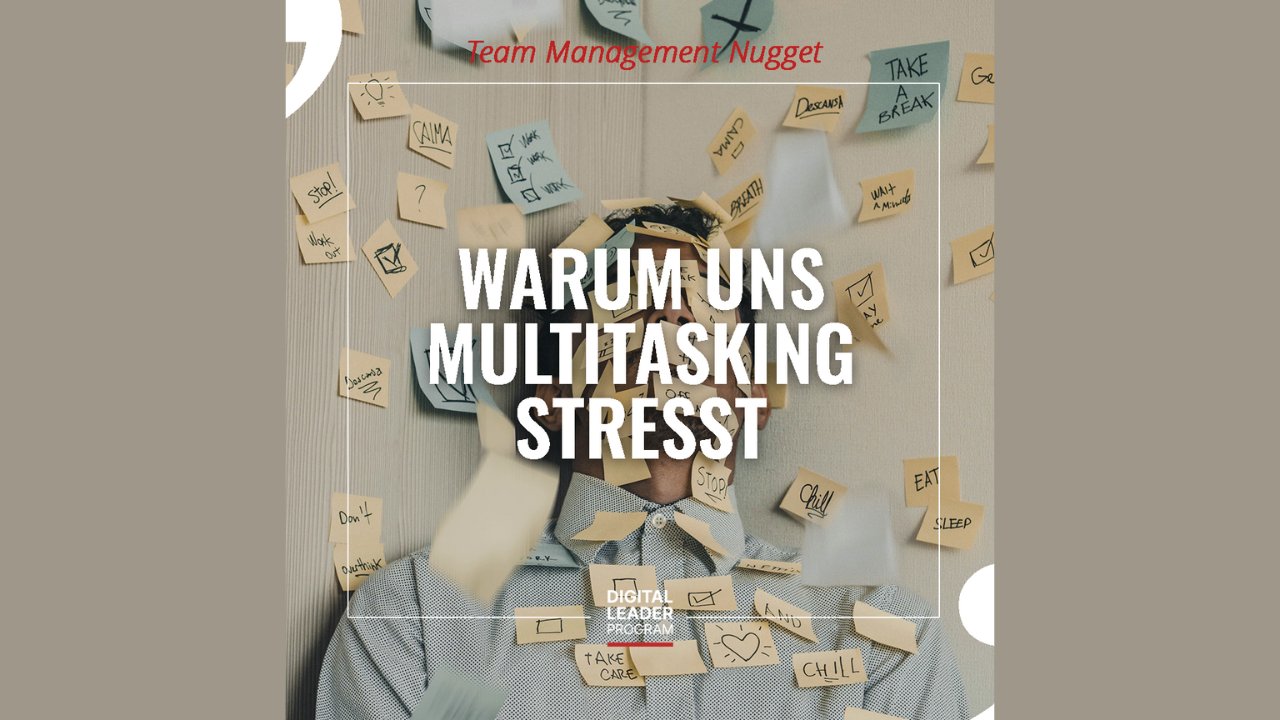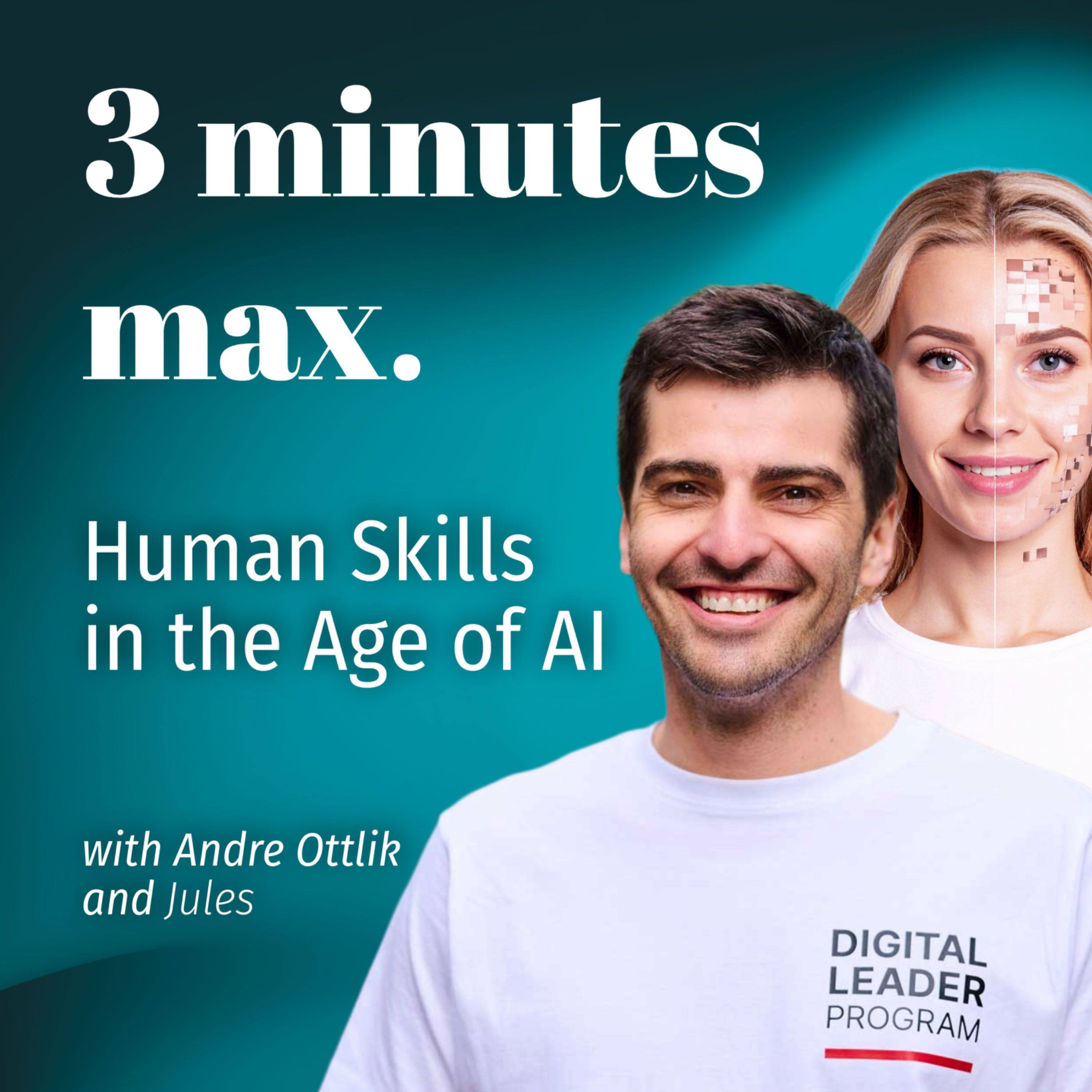Warum Multitasking zu Stress führt

Warum Multitasking zu Stress führt
Frage an dich & dein Team: Seid ihr Single Tasker oder Multitasker?
Let’s talk about Multitasking! Stell dir einmal vor, auf deinem Rechner sind an die 40 Tabs geöffnet und du arbeitest an allen immer mal wieder ein bisschen, dazwischen ein Teams Call, eine Email und ständig irgendwelche Feedbacks auf Asana… Du kannst dir denken, dass mit jedem weiteren geöffneten Fenster das System langsamer wird. #systemoverload 🤯 Macht Sinn oder?
Vielleicht ertappst du dich nun auch, dass du im Status-Meetings oder im Conference Call häufig nebenher Mails schreibst und Whatsapp checkst? Klingt als wärst du ein absoluter Multitasking Genie, aber Studien zeigen, dass durch Multitasking nicht die Produktivität steigt, sondern abnimmt. Was steigt, ist der Stresspegel und dieser lange unbewusst. Das passiert im 🧠: Task-Switching statt Multitasking Dein Gehirn wird pro Sekunde mit bis zu 300 Impulsen deiner Nervenfasern beliefert. Mit Informationen, was wir sehen, hören, riechen, ob wir sitzen, ob irgendwo Gewebe geschädigt wird etc. Diese Informationen werden aber nur super kurz gespeichert. Unser Gehirn nimmt deshalb auch immer nur Ausschnitte bewusst wahr - und zwar die, die für uns relevant sind, alle anderen Reize werden aktiv ausgeblendet. So konzentrieren wir uns auf die wichtige Infos. Wer also versucht, alles auf einmal zu erledigen, schafft nichts richtig. Außer gelernte Handlungen laufen ganz automatisch ab, etwa wenn wir beim Spaziergang telefonieren.
1. Multitasking verursacht Stress - Der Fokus wechselt zwischen Aufgaben immer wieder fix hin und her und verliert ständig den roten Faden und muss ihn wieder neu aufnehmen. Das überfordert uns und führt zur Ausschüttung von Stresshormonen. Dein 🧠 tanzt ja quasi auf allen Hochzeiten gleichzeitig.💃 Ohne Multitasking: Bist du erholter und weniger gestresst. Hast mehr Spass bei der Arbeit und nach Feierabend Energie übrig für Dinge, die dir Freude machen.
2. Multitasking führt zu niedriger Produktivität - Jeder Task Wechsel kostet doppelt Zeit. Die Zeit für den Wechsel zwischen den Aufgaben und die Zeit, bis du dich vollständig auf die neue Aufgabe konzentrierst. Die parallele Umsetzung der Aufgaben dauert dadurch länger, als wenn du diese nacheinander erledigst. Forscher der Universität Michigan fanden heraus, dass das Gehirn bis zu 40 % weniger leistungsfähig ist, wenn wir Multitasken. Rechnen wir das mal aus, können wir bei einer 40h Woche bis zu 16h gewinnen, wenn wir auf Multitasking verzichten. Ohne Multitasking: Du bist produktiver und kannst in kurzer Zeit mehr erreichen. Früher Feierabend machen und dennoch die wichtigsten Aufgaben erledigt haben, klingt gut, oder?🍻
3. Die Qualität leidet und du machst mehr Fehler - Bei jedem Wechsel zwischen zwei Tasks entsteht ein Aufmerksamkeitsdefizit. Ein Teil deiner Aufmerksamkeit bleibt für einen gewissen Zeitraum bei der alten Aufgabe. Du kannst dich nicht sofort mit vollem Fokus auf die neue Aufgabe konzentrieren. Beobachte das mal! Ohne Multitasking: Die Qualität deiner Ergebnisse ist besser und du machst weniger Fehler.🙄
So weit, so leistungsfähig: Das Gehirn kann also in Wirklichkeit nicht mehrere Aufgaben parallel erledigen. Es muss dabei hektisch hin und her springen, was unterm Strich zu mehr Stress, Müdigkeit und Fehlern führt. Also konzentrier dich an einem Ort auf eine Sache, bis sie erledigt ist. Vielleicht setzt du dich für deine nächste Tätigkeit samt Laptop woanders hin - dieser Umgebungswechsel gibt dem Gehirn das Signal für eine neue Aufgabe und kann zusätzliche Ressourcen freilegen. Sprecht auf jeden Fall auch im Team die ständige Asana Erreichbarkeit an. Es sollte möglich sein, ohne unterbrochen zu werden Aufgaben abzuarbeiten! Mut zum #Singletasking anstelle #Multitasking! Lernt im Team Tasks einzuschätzen und die Grenzen eurer Aufmerksamkeit kennen. Und auch hier wieder: Entspannung! Auf Multitasking zu verzichten braucht Training. Los gehts!
Mehr dazu erfährst du in unserem Digital Leader Program!
Why multitasking leads to stress
Question for you & your team: Are you single tasker or multitasker?
Let's talk about multitasking! Imagine you have about 40 tabs open on your computer and you are working on all of them from time to time, in between a team call, an email and constantly some feedback on Asana... You can imagine that with every additional window open the system slows down. #systemoverload 🤯 Makes sense, right?
Maybe now you also catch yourself writing mails and checking Whatsapp frequently on the side in status meetings or conference calls? Sounds like you're an absolute multitasking genius, but studies show that multitasking doesn't increase productivity, it decreases it. What increases is the stress level and this long unconsciously. This is what happens in the 🧠: Task switching instead of multitasking Your brain is supplied with up to 300 impulses of your nerve fibers per second. With information about what we see, hear, smell, whether we are sitting, whether tissue is damaged somewhere, etc. But this information is only stored for a super short time. That's why our brain only ever consciously perceives excerpts - the ones that are relevant to us, all other stimuli are actively blanked out. In this way, we concentrate on the important information. So if you try to do everything at once, you won't get anything done right. Unless learned actions run automatically, for example when we talk on the phone during a walk.
1. multitasking causes stress - The focus switches back and forth between tasks again and again fixed and constantly loses the red thread and must take it up again. This overwhelms us and leads to the release of stress hormones. Your 🧠 is practically dancing at all weddings at the same time.💃 Without multitasking: You are more relaxed and less stressed. Have more fun at work and have energy left over after work for things you enjoy.
2. multitasking leads to low productivity - Each task switch costs double time. The time for switching between tasks and the time until you fully concentrate on the new task. As a result, it takes longer to accomplish tasks in parallel than it would if you did them one after the other. Researchers at the University of Michigan found that the brain is up to 40% less efficient when we multitask. If we do the math, we can gain up to 16h in a 40h week by not multitasking. Without multitasking: you are more productive and can achieve more in a short time. Quitting work early and still having the most important tasks done sounds good, right?🍻
It takes longer to do them than if you do them one after the other. Researchers at the University of Michigan found that the brain is up to 40% less efficient when we multitask. If we do the math, we can gain up to 16 hours in a 40-hour week by not multitasking. Without multitasking: you are more productive and can achieve more in a short time. Quitting work early and still having the most important tasks done sounds good, right?🍻
3. quality suffers and you make more mistakes - Every time you switch between two tasks, you create an attention deficit. Part of your attention stays on the old task for a certain period of time. You can't immediately concentrate on the new task with full focus. Observe this! Without multitasking: the quality of your results is better and you make fewer mistakes.🙄
So far, so powerful: So in reality, the brain can't do multiple tasks in parallel. It has to jump back and forth frantically, which leads to more stress, fatigue, and mistakes on the bottom line. So focus in one place on one thing until it's done. Maybe sit down somewhere else for your next activity along with your laptop - this change of environment signals the brain for a new task and can free up additional resources. Be sure to address constant Asana accessibility in your team as well. It should be possible to work through tasks without being interrupted! Courage to #singletasking instead of #multitasking! Learn to assess tasks in the team and know the limits of your attention. And here again: Relaxation! Doing without multitasking needs training. Let's go!
Learn more in our Digital Leader Program!



